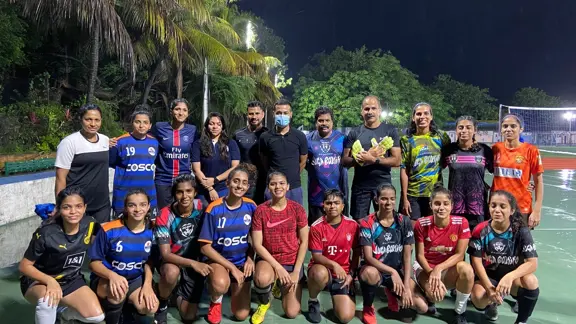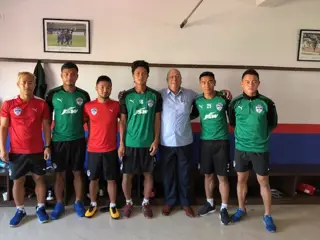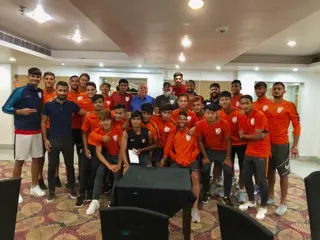News
Union in Focus: Football Players Association of India

As our name says, FIFPRO is a federation of player unions. Currently, 66 organisations are associated within FIFPRO to support professional footballers worldwide.
Get to know the Football Players Association of India (FPAI).
History
The Football Players Association of India (FPAI) is one of the younger unions. It was established in 2006 by Bhaichung Bhutia, the then captain of the men’s national team, and some of his team-mates, who were looking for a way to improve the national team’s working conditions. Together they decided to form an association to represent the interests of all footballers in India and, in 2009, the FPAI became a member of FIFPRO.
“Even though we are a union, we still call ourselves a player association,” said Siddhartha Bhattacharya, FPAI’s manager and player liaison. “In India people have difficulties with the word ‘union’, as they think that unions are always revolting and saying no. That’s why we call ourselves an association.”
Congratulations @akashmishra_4 on winning the Young Player of the Year Award. @HydFCOfficial pic.twitter.com/gmdR8UaOv1
— PFA India (@FPAI) June 15, 2022
Current situation
The FPAI is the only athlete’s association in India and collaborates with the All-India Football Federation (AIFF). However, they don’t have any official agreement.
“It is difficult as most sports bodies in India are a bit bureaucratic,” said Bhattacharya. “But we are moving forward. We are very confident that within a couple of years, we are going to be an official stakeholder.
“For example, we closely cooperate with the legal department of the AIFF, as we have been trying to establish the National Dispute Resolution Chamber and to draw up a standard player’s contract. Hopefully, the AIFF’s leadership will officially recognise us soon, although at this moment there is a governance crisis at the federation.”
What makes the situation complex is that the country has two leagues: the I-League (the oldest) and the Indian Super League (ISL, established in 2013). They exist next to each other.

“We have noticed that the better players are signing with clubs in the ISL, the I-League is becoming more of a feeder league,” said Bhattacharya.
“When launched, we welcomed the ISL as a good initiative as it increased opportunities for professional footballers. The players in this league have good working conditions and salaries, and get paid on time.
“It is exactly the opposite of the I-League, where we encounter numerous problems with salary payment, and where player conditions are not always good. Some players have contracts with ridiculous clauses.”
According to Bhattacharya, one of the FPAI’s biggest accomplishments was rallying their players in a successful effort to abolish the ISL’s draft system. Before each season commenced, the clubs would have to select players from a pool of all available Indian footballers. Clubs were only allowed to retain up to five players from the previous season.
“The players wouldn’t have a say in where they would play, and could be moved every season,” said Bhattacharya. “If a player wanted to play for Club A, but Club B picked him, then he would have to go against his will.
“The players were against this draft system, and so were we. Removing the draft was a very tough job, as the owners of the ISL are very powerful people. But we succeeded: there has been no draft since 2018.”
A huge chunk of the FPAI’s work is dedicated to solving legal issues. “That’s why we want to have a NDRC and a standard players contract, because this should solve a lot of problems in the I-League. This is our main goal, as it is so important for the players,” explained Bhattacharya.

“We have established a strong relation with the legal team of the federation. I don’t remember losing a single case where we have represented a player. I would also put that on our list of achievements.
“Another strength is that we have managed to educate players about what we do. When we visit them, we mostly go into the dressing room without an agenda, unless we are visiting them for the World 11. If you go with an agenda, you cannot hear the players.
“Now, we just talk with them – and they have the time to tell you or ask you about 100 different things: our player awards, non-payment, transfers, or about the licensing courses that we introduced. Various players got their badges and some of them are now head coaches in different teams.”
The FPAI also organises language courses. Many coaches in the Super League are foreign and only speak English, but numerous players don’t speak the language. “That’s why we started with these English courses.”
Goals
The PFAI remain committed to the development of women’s football in India. “I would like to get more and more women footballers involved,” said Bhattacharya. “Women’s football is in a pathetic state. They only have a league for one month a year, they hardly get any money. In India, women playing sports is still a bit of a taboo, especially if parents are not educated.
“We are trying to get more women members and we would like to establish a real league. It is something we have been talking about with the national team and the federation.”
